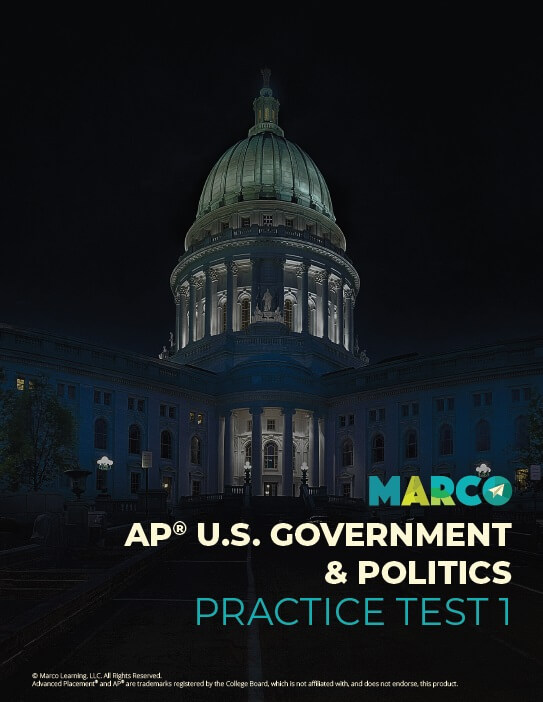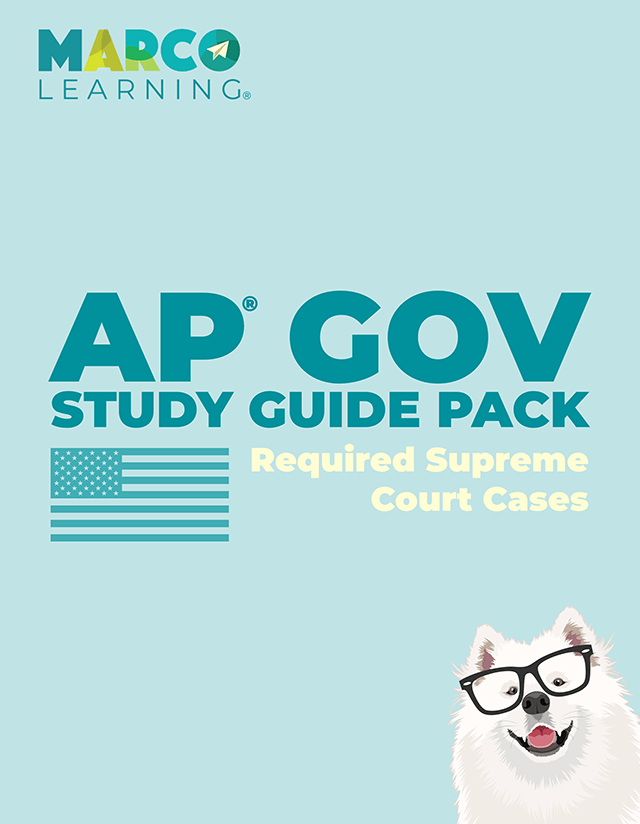


To score well on your AP® U.S. Government and Politics Exam, it is important to become familiar with all of the required Supreme Court cases. In the free-response section of your AP U.S. Government Exam, you will have to answer four essay questions. The third of these questions is a SCOTUS comparison essay, in which you will be required to compare a non-required Supreme Court case with a required Supreme Court case, so get to know each required Supreme Court case as well as possible!
The required Supreme Court cases for the AP U.S. Government and Politics Exam in 2021 are:
Marbury v. Madison (1803)
McCulloch v. Maryland (1819)
Schenck v. the United States (1919)
Brown v. Board of Education (1954)
Engel v. Vitale (1962)
Baker v. Carr (1962)
Gideon v. Wainwright (1963)
Tinker v. Des Moines Independent Community School District (1969)
New York Times Co. v. United States (1971)
Wisconsin v. Yoder (1972)
Roe v. Wade (1973)
Shaw v. Reno (1993)
United States v. Lopez (1995)
McDonald v. Chicago (2010)
Citizens United v. Federal Election Commission (2010)
PRECEDENT
Schechter v. United States (1935)—invalidated federal regulation of the poultry industry as an invalid use of congressional power under the Commerce Clause.
Wickard v. Filburn (1942)—established that the federal government has the authority to regulate the price at which goods are sold under the Commerce Clause.
FACTS OF THE CASE
In 1990, Congress passed the Gun-Free School Zones Act, making it a federal crime for an individual to knowingly possess a firearm in a school zone. In 1992, high school senior Alfonso Lopes carried an unloaded revolver onto school grounds in San Antonio, Texas. He was ultimately charged with violating the Gun-Free School Zones Act, was tried and convicted, and was sentenced to six months’ imprisonment with two years supervised release.
Lopez appealed his case, arguing that the Act under which he had been convicted was unconstitutional and that Congress had exceeded its scope of authority under the Commerce Clause by attempting to legislatively control public schools. The appeals court overturned Lopez’s conviction after which the government took the case before the Supreme Court, arguing that the possession of firearms in educational environments would lead to crime and would ultimately weaken the national economy, thus placing the issue under the purview of congressional authority to regulate economic issues under the Commerce Clause.
THE DECISION
In a 5-4 decision, the Court (led by Chief Justice William Rehnquist) upheld the appeals court’s ruling, declaring in opposition to the government that the possession of a firearm in a local school zone does not constitute economic activity and therefore has no substantial effect on interstate commerce. As such, while it affirmed that Congress has broad lawmaking power under the Commerce Clause, the Court ruled that the Commerce Clause does not extend the power of Congress to the issue of firearm regulation.
IMPACT
The decision in United States v. Lopez was the first since 1937 to hold that Congress had exceeded its Constitutional authority under the Commerce Clause. The case continues to have relevance in debates about federal versus state powers, but it ultimately upheld the legal principle that states should control local issues such as firearm possession in school zones.
SUBSEQUENT CASE
United States v. Morrison invalidated parts of the Violence Against Women Act of 1994 on the grounds that they weren’t directly economic in nature and thus exceeded congressional authority under the Commerce Clause.
KEY TERMS
Commerce Clause The section within Article I of the Constitution that gives Congress the authority to regulate commerce with foreign nations, among states (interstate commerce), and with Native American tribes.
Supremacy Clause The clause within the Constitution that makes the Constitution and federal laws stemming from it authoritative over all other laws.
The best way to get better at something is by practicing.
That’s why it’s so important that you take practice tests to help you get better at the AP U.S. Government and Politics Exam. Only then can you expect to get a good score—and even improve your score.
 Help
Help